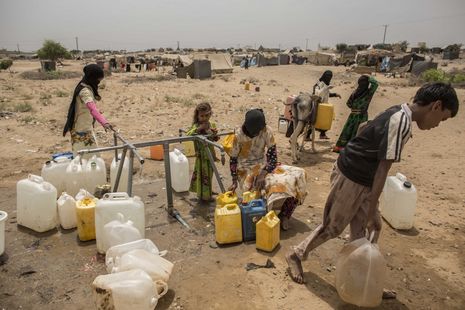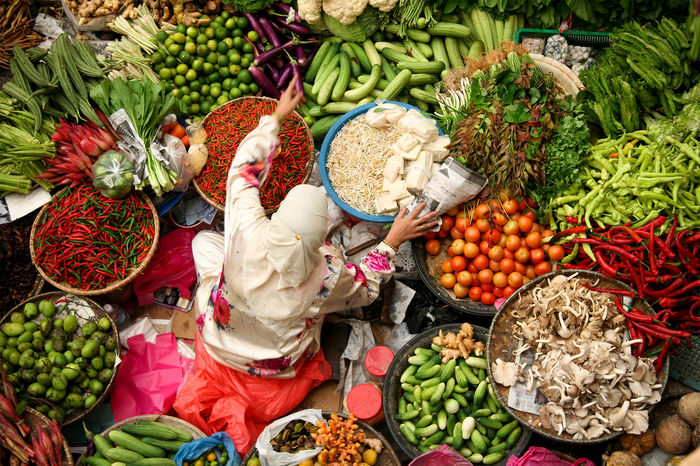Blue Tap and the weaponisation of water
Megan Cousins explores how a lack of water has dramatically worsened the Yemen crisis, and how the work of Cambridge-based Blue Tap may provide a solution.

Water: a fundamental human right and one of our most basic requirements to survive. And yet, around 10% of the world’s population don’t have access to clean water close to their home, and, out of all the world’s drinkable water supply, only 0.4% is accessible to humans. This lack of safe drinking water significantly increases the risk of individuals developing water-borne illnesses, such as cholera and typhoid. Every two minutes, a child dies from a water-related illness that could have been prevented with safe water access. The global water crisis is one of the most pressing issues facing our planet.
Chlorination is widely regarded as the most affordable, reliable and effective method of disinfecting water. Not only does chlorine kill existing pathogens in the water, it also leaves a chlorine residual, which protects the water from future contamination. This is essential in humanitarian settings, where safe water distribution and storage cannot be guaranteed.
However, because the chlorine demand of water sources can vary over time, due to changes in water temperature and pH, many families across the world who rely on chlorine tablets are unable to determine the required chlorine dose to effectively inactivate microbial pathogens. Research has demonstrated that overdosing with chlorine in a water supply can lead to severe illness, while underdosing is insufficient to disinfect the water.
Blue Tap, a Cambridge-based social enterprise, has an innovative solution. Using a human-centred design process and working closely with local communities, Blue Tap has developed a 3D-printed chlorine injector that allows individuals to take ownership of their water quality in low-resource settings.
“In fragile nation-states, increased competition for particularly scarce water resources has led to the weaponisation of one of humanity’s most basic needs.”
The injection valve controls the chlorine flow rate to ensure exactly the right amount of chlorine is added to purify the water. Moreover, the injector is durable and requires no electricity. This allows the technology to be resistant to weathering and chlorine degradation in the long-term, whilst continuing to be effective in the short-term during disruptions to power supplies.
On top of the health impacts, there is also an invisible burden of the water crisis. Women are often the primary water collectors and the main caregivers for children, who become sick due to water-related illnesses. These responsibilities reduce their available time for work or education, resulting in gendered labour divisions that manifest as heightened vulnerabilities and missed opportunities.
Indeed, women in Sub-Saharan Africa spend 40 billion hours each year collecting water – that’s equivalent to a year of labour for the entire French workforce. If this time collecting water could be re-invested in education, their income potential would rise by up to 25% each year.
Blue Tap aims to empower women by increasing access to safe, clean drinking water in their home. This reduces the burden of the water crisis on women, allowing them to spend more time in paid work and education.
The need for clean water supplies, and water disinfection technologies, such as Blue Tap, is particularly evident in humanitarian crises. In fragile nation-states, including Yemen, Iraq, and South Sudan, increased competition for particularly scarce water resources has led to the weaponisation of one of humanity’s most basic needs.
“19.3 million Yemenis, or 75% of the population, have been left without access to clean water and sanitation.”
In conflict-afflicted nations, opposition groups can seek to destroy water infrastructure. This involves targeted attacks on the power or fuel supplies that keep the water systems running. When the flow of clean water stops, vulnerable groups, such as children, are forced to travel further to collect water or to rely on more unsafe water supplies.
The everyday reality of such targeted attacks on water supplies for vulnerable populations can be clearly seen in Yemen. Since the civil war began in 2015, as Iranian-backed Houthi rebels battle Emirati- and Saudi-trained militias, water has become an even scarcer resource and has been increasingly harnessed as a weapon of war.
Yemeni communities have experienced the destruction of water and sanitation infrastructure by airstrikes. Fuel shortages amid the conflict have increased the cost of water extraction by diesel-powered pumps and reduced the capacity of many communities to adequately treat public water supplies. As a result, 19.3 million Yemenis, or 75% of the population, have been left without access to clean water and sanitation.
The scarcity of safe drinking water has also driven a sharp rise in cholera cases in Yemen. Cholera patients can often be quickly treated with oral rehydration solutions and antibiotics. However, the collapse of Yemen’s health system has meant that infection can prove fatal. For children under five years old living in conflict-afflicted areas across the world, this means they are 20 times more likely to die from water-borne diseases than from the violence itself.
Perhaps even more shockingly, children in Yemen have allegedly been the target of sniper attacks while waiting to collect water at pumps. Muna Luqman, the chair of Food4Humanity, a local Yemeni charity, explains “a lack of laws to regulate water use, combined with climate stresses such as drought and extreme heat, has worsened health and social problems with women and children worst-hit. [Fighters] speak about freedom and human rights… while they kill and maim women fetching water for their starving families.”
Beyond this, Luqman, who has previously worked with tribes in remote locations to develop shared water points, goes on to explain that “using water wisely can foster peace.” Achim Steiner, the UNEP Executive Director, agrees that “the sound governance of water resources is vital for promoting peace and stability and is among the highest priorities during post-conflict recovery and peacebuilding.” Strategies include Joint Water Committees and local-scale collaborations to promote water cooperation and peace talks between neighbouring states.
With more than half of the world’s population predicted to live in water-scarce locations by 2050, effective water disinfection and management, such as that provided by Blue Tap, will be key to mitigate new tensions over vital water resources in humanitarian crises. The weaponisation of water in conflict illustrates that access to clean water can be not only life-changing but, in many cases, life-saving.
 News / Eight Cambridge researchers awarded €17m in ERC research grants27 December 2025
News / Eight Cambridge researchers awarded €17m in ERC research grants27 December 2025 News / Downing investigates ‘mysterious’ underground burial vault 29 December 2025
News / Downing investigates ‘mysterious’ underground burial vault 29 December 2025 Lifestyle / Ask Auntie Alice29 December 2025
Lifestyle / Ask Auntie Alice29 December 2025 Sport / Hard work, heartbreak and hope: international gymnast Maddie Marshall’s journey 29 December 2025
Sport / Hard work, heartbreak and hope: international gymnast Maddie Marshall’s journey 29 December 2025 Interviews / Meet Juan Michel, Cambridge’s multilingual musician29 December 2025
Interviews / Meet Juan Michel, Cambridge’s multilingual musician29 December 2025










